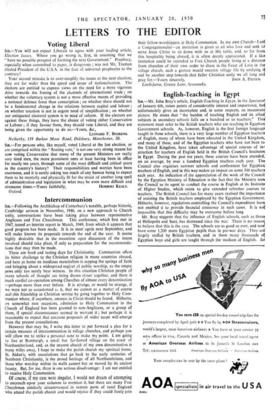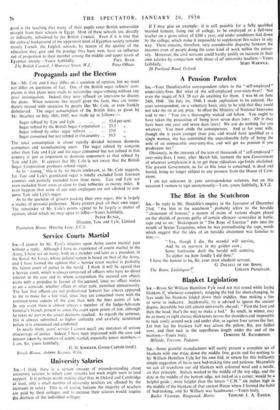English Teaching in Egypt Slit,—Mr. John Bray's article, English-Teaching in
Egypt, in the Spectator' of January 6th, raises points of considerable interest and importance, bu unfortunately gives an incomplete and, in some respects, an inaccurat picture. He states that " the burden of teaching English and its allied subjects in secondary schools falls on a hundred or so teachers." Thies statement must refer to the British teachers who are teaching in Egyptian! Government schools. As, however, English is the first foreign language taught in these schools, there is a very large number of Egyptian teachers of English, many of whom have been educated in the United Kingdom, and many of these, and of the Egyptian teachers who have not been to the United Kingdom, have taken advantage of special courses of in.+ struction for teachers of English held in the British Council's Institutes in Egypt. During the past ten years, these courses have been attended; on an average, by over a hundred Egyptian teachers each year. The Council also organises summer schools and conferences for Egyptian! teachers of English, and in this way makes an impact on some 300 teachers each year. An indication of the appreciation of the work of the Council by the Egyptian Ministry of Education is the fact that the Ministry uses the Council as its agent to conduct the course in English at its Institutes of Higher Studies, which exists to give extended refresher courses to teachers. The British Council has for many years realised the importance of assisting the British teachers employed by the Egyptian Government Hitherto, however, regulations controlling the Council's expenditure have not enabled it to provide financial assistance in such cases. It is no impossible that this difficulty may be overcome before long.
Mr. Bray suggests that the influence of English schools, such as those! at Heliopolis and Suez, has decreased since the war. There is no reasor4 to believe that this is the case. The schools are as good as ever, and nose have some 1,200 more Egyptian pupils than in pre-war days. They and largely staffed by British teachers, and in them many thousands oq Egyptian boys and girls are taught through the medium of English.
good is the teaching that many of their pupils enter British universities straight from their schools in Egypt. Most of these schools are, directly or indirectly, subsidised by the British Council. Even if it is true that the cultural background of the uppermost level of Egyptian society remains mostly French, the English schools, by reason of the quality of the education they give and the prestige they have won, have an influence out of proportion to their number among the middle and upper levels of
Egyptian society.—Yours faithfully, PAUL REED,
The British Council, 3 Hanover Street, W.1. Press Officer.



































 Previous page
Previous page